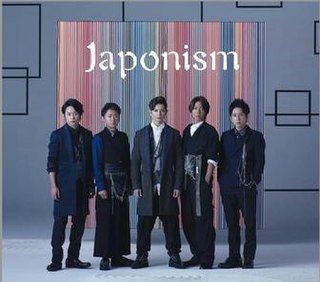
Rainbow is the fifth studio album by Japanese recording artist Ayumi Hamasaki, released on 18 December 2002 by Avex Trax. Production of Rainbow had commenced after the release of Hamasaki's fourth studio album I Am... that January; All lyrics were written by Hamasaki, and Japanese producer Max Matsuura returned to produce the album. The album was Hamasaki's first to feature conversational English lyrics, where in her previous works she had only used single words.

Utada Hikaru Single Collection Vol. 1 is the first compilation album by Hikaru Utada, released on March 31, 2004. It features all A-sides of her hit singles to that date, including 11 number-one hits and all 15 tracks reached the top 5. The album version was remastered by Ted Jensen. The album was released on iTunes in April 2004.

Best of Soul is the second Japanese compilation album by South Korean recording artist BoA. This is her first greatest hits album to contain her Japanese songs. The album was released on February 2, 2005, under Avex Trax.

Love & Honesty is the third Japanese studio album by South Korean singer BoA, released via Avex Trax on January 15, 2004. The album also came in a "Perfect Edition" which had two discs—the standard CD and a DVD. Love & Honesty experienced commercial success in Japan, where it was number one on the Oricon charts for two weeks. In its first week the album sold 296,781 copies while during its second week it sold 145,325 copies. Love & Honesty was certified Triple Platinum by the RIAJ within a month of its release and was the 13th best-selling album in Japan during 2004.

My Name is the fourth Korean-language studio album by South Korean recording artist BoA, released through SM Entertainment on June 11, 2004. BoA promoted the album with the singles "My Name" and "Spark", the latter of which is a Korean-language cover of "Keep My Cool" (2002) by Luis Fonsi. The album saw BoA's transition into a more mature image in comparison to her previous records.

No. 1 is the second Korean-language studio album by South Korean recording artist BoA. The album's composition and arrangement was handled by several music collaborators, such as Yoo Young-jin, Kangta, Ahn Ik-soo, Sigurd Heimdal Rosnes, among others. Released through SM Entertainment on April 12, 2002, No. 1 marked BoA's return to South Korea following the release of her debut Japanese album Listen to My Heart a month prior, which saw widespread recognition in Japan.

Listen to My Heart is the debut Japanese studio album by South Korean recording artist BoA, released via Avex Trax on March 13, 2002. BoA worked with a team of songwriters and composers to produce the album, including Natsumi Watanabe, Kazuhiro Hara, Ken Harada and Akira; all of whom would collaborate with BoA again on her future albums. Musically, Listen to My Heart is primarily a pop record with influences from R&B.

Outgrow is the fourth Japanese studio album by South Korean recording artist BoA. It was released through Avex Trax on February 15, 2006, and features the singles "Do the Motion", "Make a Secret", "Dakishimeru", and "Everlasting". The album also features the track "First Snow" from BoA's special digital single, "Merry Christmas from BoA". Several of the album's songs have either been written or composed by BoA herself.

The discography of South Korean musician BoA consists of twenty-one studio albums, eight compilation albums, three extended plays (EPs) and numerous singles. BoA debuted as a musician through South Korean talent agency SM Entertainment at the age of 13 with the album ID; Peace B (2000), followed by her debut in Japan with Avex Trax in 2001.

"Every Heart " is a song recorded by South Korean singer BoA. It was released as her fifth single under Avex Trax on March 13, 2002, the same day as her Japanese debut album Listen to My Heart. It was featured in the hit anime, Inuyasha, as the fourth and the second (Korean) ending theme song.

"Valenti" is a song by South Korean singer BoA. It was released for her second Japanese studio album of the same name (2003) on August 28, 2002, serving as her sixth Japanese single under Avex Trax. It features "Realize " as a B-side. A Korean version of "Valenti" was released as part of her compilation album Miracle, which was made available by SM Entertainment on September 24, 2002.

"Meri Kuri", known in South Korea as "Merry-Chri", is a song recorded in two languages by South Korean singer BoA. A holiday-themed ballad, its lyrics were written by Chinfa Kan and BoA; production was handled by Kazuhiro Hara. It was released on December 1, 2004, as her 14th Japanese single, via Avex Trax; and her 3rd physical Korean single, by SM Entertainment. Both versions are supported with the B-side tracks "Mega Step" and "The Christmas Song". Its music video premiered on her 18th birthday and was shot at the Chapel on the Water and Ochiai Station in Hokkaidō.

South Korean pop group TVXQ, known as Tohoshinki in Japanese releases, have released twenty studio albums, three extended plays, four compilation albums, ten live albums, four remix albums, one soundtrack album and one box set. The group has sold over 14 million physical records since 2004, including 9.4 million in Japan, making them one of the best-selling K-pop acts of all time.

The discography of Japanese R&B singer Misia consists of nine studio albums, three compilation albums, one extended play (EP), one live album, six remix albums, twenty-six singles, twelve promotional singles, eighteen video albums and thirty-seven music videos. In 1997, Misia signed a recording contract with BMG Japan and joined the then up-and-coming talent agency, Rhythmedia. Under the sub-label Arista Japan, Misia released her first single, "Tsutsumikomu Yō ni..." in February 1998, followed by "Hi no Ataru Basho" in May. In June, her debut album, Mother Father Brother Sister, opened at number three on the Oricon chart. The album peaked at number one three weeks later and stayed in the top five for eleven consecutive weeks. Mother Father Brother Sister was certified double million and won a Japan Record Award for Best Album, as well as a Japan Gold Disc Award for Pop Album of the Year. In 2000, Misia's second studio album, Love Is the Message, debuted at number one and was certified double million. It won a Japan Record Award for Best Album and a Japan Gold Disc Award for Pop Album of the Year. The album spawned three top ten hits: "Believe," "Wasurenai Hibi" and "Sweetness." Misia's first remix album, Misia Remix 2000 Little Tokyo, was released three months later and shot to number one. It sold over 800,000 copies and is the second best-selling remix album of all time in Japan.

Made in Twenty (20) is the fifth Japanese studio album by South Korean singer BoA. It was released on January 17, 2007, by Avex Trax. The title of the album refers to the fact that this is her first album since leaving her teenage years and her first album made in her 20s - specifically, when she was twenty years old. The album debuted with first-week sales of 182,009 copies, debuting at number one.
Japan occupied Korea as a colony from 1910 to 1945. South Korean musicians have been successful in Japan since the inception of Korean popular music. There have been a number of ethnically South Korean singers who have gained fame in Japan. Some of these singers, including Choi Gyuyeop/Hasegawa Ichiro and Yi Nan-yong/Oka Ranko were Zainichi, Koreans with Japanese residency. Among these Zainichi artists, there were and still are some who have made public declarations of their Korean descent, and many more who were rumored to be Korean but have never made formal confirmations. Those who do divulge their heritage often do so after they have attained a relatively stable level of popularity. The act of revealing one's Korean ethnicity is called “coming out.” Nevertheless, there were South Korean singers like Cho Yong-pil and Kye Un-seuk, in the 1970s and 1980s who were household names in Japan, despite not being Zainichi. Today, there are also a number of non-Zainichi Korean artists such as BoA, Crystal Kay, TVXQ, BIGBANG, KARA, and BTS who have found chart and album success in Japan.

Perfect Crime is the second studio album by Japanese recording artist Mai Kuraki. It was released on July 4, 2001, by Giza Studio.

Best Selection 2010 is the first Japanese greatest hits album from South Korean pop group Tohoshinki, released in Japan on February 17, 2010, by Rhythm Zone. It contains songs from their albums Heart, Mind and Soul (2006), Five in the Black (2007), T (2008) and The Secret Code (2009). It also features four new singles, two of which are certified platinum by the Recording Industry Association of Japan (RIAJ). Best Selection 2010 is the final album release by the group with its original five-member lineup.

Japonism is the fourteenth studio album of the Japanese idol group Arashi. The album was released on October 21, 2015 under their record label J Storm in three editions: a first press/limited edition, a Yoitoko limited edition, and a regular edition. The first press edition comes with an 84-page photo lyrics booklet and bonus DVD with the music video and making-of for the album's lead track, "Kokoro no Sora". The Yoitoko limited edition comes with a 32-page lyrics booklet, and the regular edition comes with a 36-page lyrics booklet. The album sold over 820,000 copies in its first week and topped the Oricon charts for two consecutive weeks. With more than 1,000,000 copies sold, the album was certified for Million by the Recording Industry Association of Japan (RIAJ). On December 23, 2015, Oricon ranked Japonism as the best-selling album of 2015 in Japan. On February 27, 2016, Japonism was awarded Album of the Year in the 2016 Japan Gold Disc Awards.


















